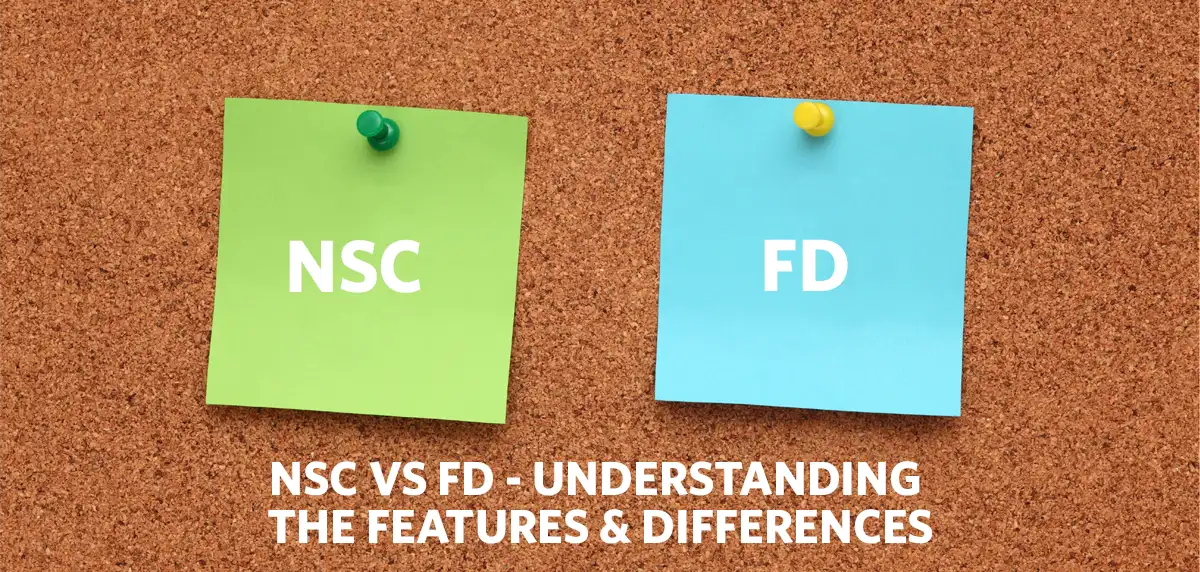If you are a risk-averse investor, you can choose from a variety of safe investment options in India, of which Fixed Deposits (FDs) and National Savings Certificate (NSC) are notable. Both these instruments offer fixed returns and the safety of your capital, and are ideal for conservative investors who prefer financial security.
Let’s learn more about the differences between NSC and FDs.
What is NSC?
The National Savings Certificate or NSC is a government-backed small savings scheme offered through post offices. It is meant for individual investors who want a safe, fixed return on their savings. NSCs are only available at India Post Offices, and they come with a fixed maturity period and assured interest rates.
Features of NSC
To understand which is better - NSC or FD, let’s look at the features of NSC first.
1. Fixed Tenure
NSCs come with a 5-year maturity period. Once you invest, your funds are locked in for the entire duration and can be accessed only after the lock-in period is over (except in certain cases).
2. Assured Returns
The government decides the interest rate for NSC and revises it every quarter. Currently, NSCs offer an annual interest rate of 7.7% (for Q1 of FY 2025-26). The interest is compounded annually and payable at maturity.
3. Tax Benefits**
Investments in NSC qualify for tax deductions under Section 80C of the Income Tax Act (up to ₹1.5 lakh per year). However, the interest earned in the fifth year is taxable.
4. Available at Post Offices
You can invest in NSC by visiting any post office in India. The minimum amount you can invest in NSCs is ₹1000 or multiples of ₹100.
What is an FD?
A Fixed Deposit or FD is a product offered by banks and non-banking financial institutions where you deposit a lump sum for a fixed period and earn interest on it. FDs are known for their ease of opening and flexibility in terms of tenure and payout options.
Features of FDs
Now, let’s briefly look at FD features, in order to better compare NSC vs FD:
1. Flexible Tenure
The tenure of an FD can range from 7 days to 10 years; you can choose a tenure depending on your financial goals.
2. Fixed Interest Rates
FDs offer fixed interest rates for the entire tenure. Rates may vary from one bank to another and are usually higher for senior citizens. You can use an FD calculator to estimate the returns based on the interest rates.
3. Easy Liquidity
Though breaking an FD before maturity may attract a penalty, most banks allow premature withdrawal, which means your liquidity needs can be met.
4. Taxation**
Tax-saving FDs with a 5-year lock-in period qualify for deduction under Section 80C. However, the interest earned on FDs is fully taxable and subject to TDS if it crosses the threshold.
Key Points of Difference Between NSC and FDs
Now that we have a clear idea of both, here are some key points that compare NSC and FD:
Parameters
| NSC
| FD
|
Backed By
| Government of India
| Banks/NBFCs
|
Minimum Investment
| ₹1000 (or multiples of ₹100)
| Varies as per bank (usually around ₹1,000)
|
Tenure
| 5 years fixed.
| Varies as per bank - usually 7 days (minimum) to 10 years (maximum).
|
Interest Rate
| Fixed by the government and revised every quarter.
| Depends on the bank.
|
Payout
| Corpus is paid out only at maturity.
| Can opt for regular payout options (monthly, quarterly, half-yearly, yearly, etc.) before the end of the tenure.
|
Liquidity
| Locked in till maturity (premature withdrawal allowed only in certain cases).
| Premature withdrawal (regardless of the reason) allowed with a penalty.
|
Tax Benefits**
| Section 80C deduction up to ₹1.5 lakh.
Interest is taxable for the 5th year. For the first 4 years, where the interest is reinvested, it is not eligible for taxation.
| Only tax-saver FDs are eligible for Section 80C deduction.
Interest is taxable (TDS applicable if the earnings are above the threshold).
|
Availability at
| Post Offices
| Banks and online platforms.
|
The above table outlines the main points of difference between NSC and FD and can help you in making a side-by-side comparison. Whether you are thinking of NSC or FD, the right choice depends on your needs. If you prefer government-backed security and fixed returns and are okay with locking in your funds, NSC is a great option. But if you value flexibility, early access to funds, or want income at regular intervals, FDs might be more suitable.
Additionally, rather than pitting fixed deposit vs NSC and choosing either one, you can include both in a diversified portfolio.
** Tax exemptions are as per applicable tax laws from time to time.





















